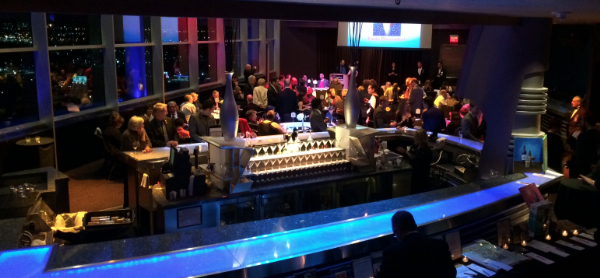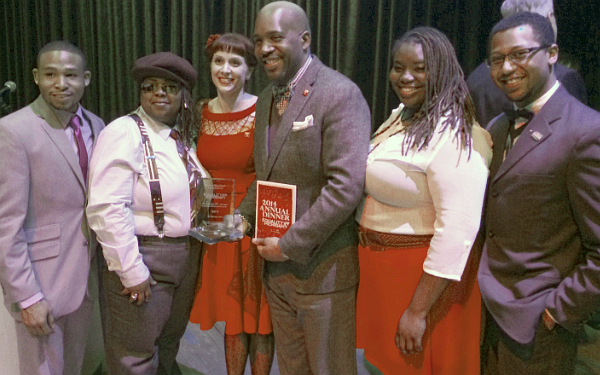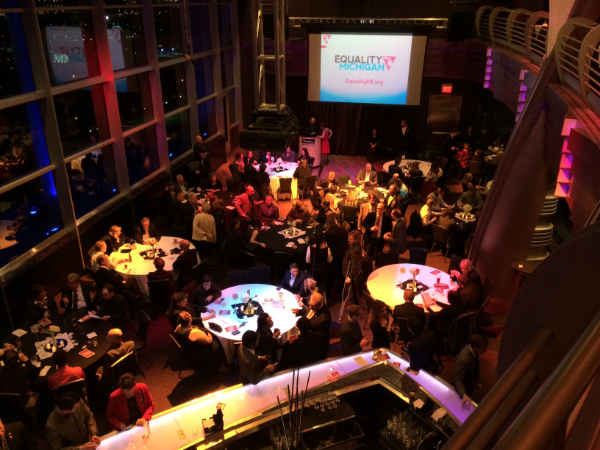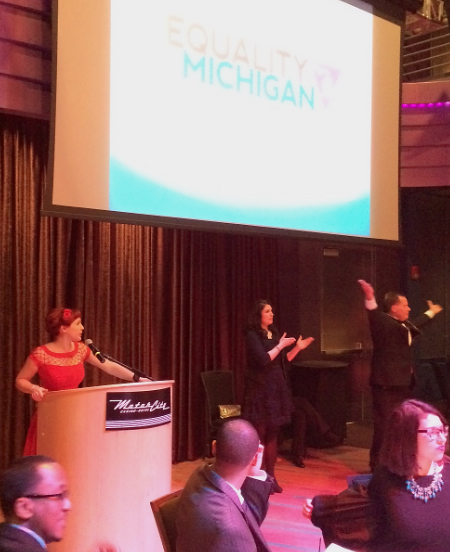
On Saturday night this past weekend, the heroes who are Equality Michigan had their annual fundraising dinner and awards banquet. Although a couple of hundred people attended, it was a surprisingly intimate event on the top floor of the Motor City Casino in Detroit. With the dramatic Detroit skyline dominating the room, LGBT activists and allies gathered to celebrate their achievements and to recognize those who have contributed the most to the cause over the past year.
The following awards were given out:
Partners in Progress Award – Badlands Strategies for their work organizing the Unity Coalition and being a major contributor to the recent success of the One Royal Oak campaign.
Heather MacAllister Award – KICK – The Agency for LGBT African Americans for their work raising awareness of LGBT issues in Detroit including their “LGBT in the D” campaign.

KICK members receive their award from Michigan Equality Managing Director Emily Dievendorf
Catalyst Award – Dusty Farmer for her pivotal role as an Oshtemo Township Trustee in the recent passage of the municipality’s LGBT inclusive nondiscrimination ordinance.
Catalyst Awards – State Representatives and current County Clerks Lisa Brown (Oakland) and Barb Byrum (Ingham) for their vocal support and advocacy for marriage equality in Michigan.
HIV Advocacy Award – Hank Milbourne, Chief Program Officer at AIDS Partnership Michigan for his service to people living with HIV in Michigan.
Henry D. Messer Youth Activist Award – Kalamazoo Gay and Lesbian Resource Center Community Engagement Coordinator Megan Bauer for her leadership in promoting the KGLRC’s “I Commit” campaign and effort to grow the LGBT movement in Michigan.
Dave Agema Stagnation Award – Dave Agema for all of the obvious reasons.

The keynote speaker was Richard Carlbom who has been fighting for marriage equality across the country for years. In just two years, Carlbom was part of two major wins: the defeat of a ban on same-sex marriage in Minnesota and then the passage of legislation to allow same-sex couple to marry a short time later.
Here are some highlights from his comments:
I have this job with Freedom to Marry, the campaign to win marriage equality nationwide, and I think about our strategy. It’s actually pretty simple: to increase support for marriage equality across the board, across all demographics, to 60% by the time we get to the end of 2016. We’re almost there; we’re at 56% nationwide. We want to increase the number of states who have the freedom to marry. And, finally, we want to do away once and for all with that horrible piece of legislation called the Defense of Marriage Act or DOMA in Washington, D.C.We think that this roadmap to victory is the way we’re going to bring about the climate that is required when the Supreme Court next hears a marriage case. We need to create the climate that Justice Kennedy, let’s be frank, can get to marriage equality.
And we think Michigan is next.
A lot of people say, “In 2012, on Election Day, for the first time in history we actually won at the ballot box. What happened? How’d it work?”It’s true. Until November 6th, 2012, we’d gone to the ballot 31 times and lost each and every time when it came to the question of marriage. But on that Election Day in November 2012, we won four for four. So people ask, “What the trick? What’s the strategy? Can you share it?”
And I can. I share it all the time and I want our opposition to know. Here’s the trick:
The more people talk about why marriage matters, the more we win. So all we have to do is spark conversations.
This is just one statistic: In Minnesota, we found that if somebody hadn’t had a conversation about same-sex marriage and why marriage matters, we were about 46% on our best day. But, for those who had had a conversation about marriage and why marriage matters, we were at 78%.
Before 2012, some people were saying, “We’ve lost 31 times. We might not be doing this right!” So we took a step back and we did some incredible research in 2010 and 2011. What we did was to ask straight voters, “Why did you get married?” And, without hesitation they said, “Well, I fell in love. We fell love in college, wanted to make that commitment and start a family. It’s all about love.”So we asked those same people, “Why do same-sex couples want to get married?” And this was their response: [SILENCE]. And then when you let them wait a little bit, they say, “I’m blanking. I have no idea.” They had no idea why people like Justin my husband and I want to get married.
And then, if you really push them, they say, “For rights and benefits. Like access to 401Ks or pensions or hospital visitations.
We discovered in 2010 that there’s massive disconnect between why straight people get married and why they think same sex couples get want to get married. And that’s because they didn’t think that we had the same reasons as them. So, in Minnesota and Maine and Washington and Maryland in 2012, all of our campaigns set out on one mission and that was to get as many people talking with the right information as possible.
Marriage is about love, commitment, and responsibility. And we have to make sure through public education efforts, we lift up that message. We have to encourage people, both our usual messengers and our unexpected messengers, we have to encourage everyone who is willing to speak up about this to do it in the right way.
The results of this approach stand on their own. Fourteen months ago six states had marriage equality, today seventeen states and the District of Columbia. We’ve been winning, we’re on a major winning streak, and we want to win in Michigan. We are going to win in Michigan in the next two and half years, I can guarantee you that.
Equality Michigan Managing Director Emily Dievendorf spoke passionately about the need for the LGBT movement in Michigan to come together in a unified way as we move forward. Speaking of the sea change that’s happened in terms of public opinion about marriage equality in Michigan, she said, “We have changed our hearts. We have changed our hearts here in Michigan. 59% of Michiganders now think a ban on same-sex marriage is unconstitutional.”
But, we need to do a better job of working together, she warned. “We need to be functional as a movement,” she said, “And we need to be more cohesive in our efforts. Because regardless of what happens in the [DeBoer vs. Snyder] marriage equality lawsuit that begins Tuesday, we ARE going to go to the ballot in 2016. We’re moving fast even though it should have happened in the past.”
She ended by encouraging the crowd to be strong in the face of adversity saying, “Stigma and what we are afraid people will think of us is not enough to keep us from doing what is right.”

Emily Dievendorf takes the podium
Finally, Dievendorf brought KICK member Rhiannon Chester (second from the right in the second photo above), a poet who had written a piece for the event. It was a powerful moment and I am reproducing her poem here with permission.
If you’d like to support the fine and important work that Equality Michigan is doing, click HERE and make a donation today.
We Be Free
by Rhiannon ChesterOur ancestors are the souls of
maimed black bodies
slain black sons
raped & tattered
mothers, daughters, wombs.
Trans bodies found in pieces.
We’re looking for our pieces
Parts that would complete this…
So often told to find them when we,
Rest in Peace.There is
Revolution,
In death.
Disgrace,
In forgetting what the travelers died for.We be free!
Free in February.
Let’s discuss our
History,
Our herstory,
Our hurt stories.We be free
These 28 days
29 on the 4th year…
Took us 212 years to trust
Us enough to lead us.
Now we be free.We got the gays on TV.
White lesbians in Cali speaking for me.
17 states got the right to marry.Oh but we be freeeee
Iesha can’t tell Keisha that his name
Don’t match his identity
On a gender binary
Dodging stares of confusion
Questions that feel like intrusion
Worldly preoccupation with genitals
Minimization of humans to acts
Denied standards of living
Jobs and housing
Just for living
A thirst to know all facts
Before we be equalBut we be free
Little girls afraid of dark corners
In night rooms
Memories of a dark, bigger figure
Looming with a declaration of doom
“you bet not scream”
Little girls fear ourselves and our dreams
Dark confusion of love
Distort realities of what female bodies
Deserve dailyThis black body
This black body
That has the lives of many black bodies
This woman body ain’t never been our body
We shoulda listened to our Fannie Lou Hamers
Nothing new about pussies in dangerOh we be free
But teach shame of this body
Live in a country
Where we preach and beseech
Disgust of her cleansing
Menstruation turned into humiliation
Shame of this woman bodyBut we be free
My Trayvons
We’ll never forget
All of our Trayvons
Our Emmetts
Our Troys
Our Oscars
And the hundreds slain
That go unnamed.
Lives taken
No regard
Justice ain’t just
Irrational fears
Calls us the
Malignant keepers of the pigment.
Black, yellow, white and brown
Taught to divide then conquer
But together we’d feel our power…So since we be free
Let me tell you what freedom looks like
To me…Us.
Being true about where we are
Not perfect.
But perfection sparks revolution
Less often than mistakes.Mistakes being made
Challenges being had
Until it looks like
Less people shrinking
Into closets
Making ourselves fitLet us live,
Beautifully in intersections.
Cross pollinating
Feminism with environmentalism,
Food forests with creating families that reflect our identities,
Fluidity with ideology.We will
Stand on the bright side of pain
Use our justices
Economic, digital, reproductive, environmental
Social and all political.
Stop producing criminals through pipelines
Rid ourselves of our complexes
Realize that we’re all complex
See the beauty in differences
Even when we feel indifferent.Freedom looks like
Us.
More of us.
Speaking our truths
We celebrate the brave history makers
The courage of
Brittney
Jason
Robin
Raven
Frank
& Ellens
The ones who fight like
Emily even
You and me
But it’s time to move past being
The exception to the rule
Able to live “free” because of the space we’re inFreedom looks like
Youth safely in their homes
Being loved.
Families able to provide
No more suicide
Access to quality
Health & education
No limits in place
No matter race, gender or presentation
SafetySo since
We be free
Freedom looks like
Us.
Able to just be.
[Crappy iPhone photos by Chris Savage]



